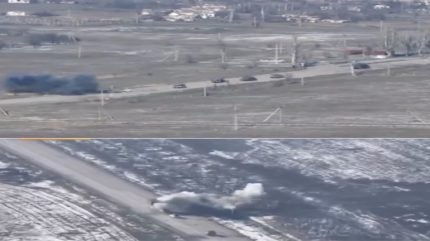
The scheduled 27th rotation of the International Atomic Energy Agency (IAEA) team currently based the Zaporizhia NPP (ZNPP) was cancelled on 12 February as a result of intense military activity in the region, Director General Rafael Mariano Grossi said. Despite written assurances received from both sides that the planned rotation could take place safely, the situation proved to be too dangerous for the teams to continue and the mission was aborted, IAEA noted. The rotation was originally scheduled for 5 February but was unable to take place for security reasons.
“I deeply regret today’s cancellation of the carefully prepared and agreed rotation of our staff, who are carrying out vital work in very challenging circumstances to help prevent a nuclear accident during the military conflict. It is completely unacceptable that the safety of our staff is jeopardised in this way,” Grossi said.
“As a result of these extremely concerning events, I am in active consultation with both sides to guarantee the safety of our teams and to secure the continued presence of the IAEA at the Zaporizhia NPP to enable our staff to continue their indispensable mission, helping to maintain nuclear safety and security,” he said.
ZNPP’s press service said on its Telegram channel that the planned rotation of four IAEA specialists was cancelled due to provocations by Ukrainian troops. “Our joint task with the IAEA – ensuring the safe work of the agency’s inspectors at the plant – is under constant threat due to enemy provocations,” the report said.
The Russian Foreign Ministry said in a statement that the scheduled rotation of IAEA at ZNPP, which was postponed from 5-12 February did not take place again and accused the Ukrainian Armed Forces of disrupting the rotation. The postponement was due to “the provocative actions of the Ukrainians, who refused to let the experts of the agency’s secretariat pass through.”
The Ministry’s report said the Russian side had “fully ensured preparations for the rotation.” Russia had provided security guarantees to the IAEA specialists and their accompanying persons with a description of the specific movement pattern, carried out the necessary engineering and technical work, and sent a team to the agreed point for a meeting of the IAEA experts.
According to the Ministry, the Russian military waited for several hours for the IAEA experts at the agreed place, but the specialists did not appear. The decision to withdraw the Russian rotation support team was made “due to the fact that the situation in the meeting area was deteriorating and unacceptably high risks were created for both Russian military personnel and secretariat experts”
The Ministry added: “While returning, the convoy containing Russian military personnel and experts from the IAEA secretariat, who were supposed to leave the Nuclear Power Plant, was hit by UAVs and mortar fire”.
Russian Foreign Ministry Maria Zakharova confirmed in a video address that Russian servicemen who were supposed to accompany a group of IAEA employees waited unsuccessfully for experts for several hours under the threat of shelling. After the IAEA staff failed to show up, the military was recalled, and on their return, their convoy was attacked by drones and mortar fire.
Izvestia subsequently published a video of the attack on the convoy. “Four inspectors were supposed to arrive at the nuclear facility, but during the advance of the convoy to the meeting point, the Armed Forces of Ukraine violated the silence regime and fired mortars at the convoy. The commission continued to move, and then again came under fire,” Izvestia reported. “When the IAEA convoy was moving towards Checkpoint No 2, it was attacked by FPV drones. In total, two mortar attacks, five artillery attacks and four FPV attacks were recorded during the rotation, and observers were forced to cancel the rotation.”
Maksim Pukhov, acting head of the Energodar Administration, on his Telegram channel suggested that a new rotation route for the IAEA mission experts to ZPP, excluding the territory of Ukraine, should be safe – from Energodar via Rostov-on-Don to Moscow.
Zaporozhye Region Governor Yevgeny Balitsky said on his Telegram channel that earlier on 12 February the Ukrainian Armed Forces had also launched a drone strike on a parking lot of the NPP operators’ town of Energodar. The strike was located 300 metres from the station’s first reactor. He said the attack on the IAEA inspectors was “a cynical provocation” adding “but thanks to the protection and efforts of the military commandant’s office of Zaporizhia region and Rosgvardiya, all the IAEA specialists are safe.”
According to Reuters, Ukraine accused Russia of deliberately disrupting rotation of the IAEA mission citing Foreign Ministry spokesman Heorhii Tykhyi. “(Russia) gives vague signals of its supposed readiness to guarantee safe passage, but an hour before the start of the rotation it opens fire or starts hostilities in the area,” Tykhyi said. He added that Moscow’s goal was to force the IAEA team to travel through Russian-controlled territory and “violate Ukraine’s sovereignty and territorial integrity”.






